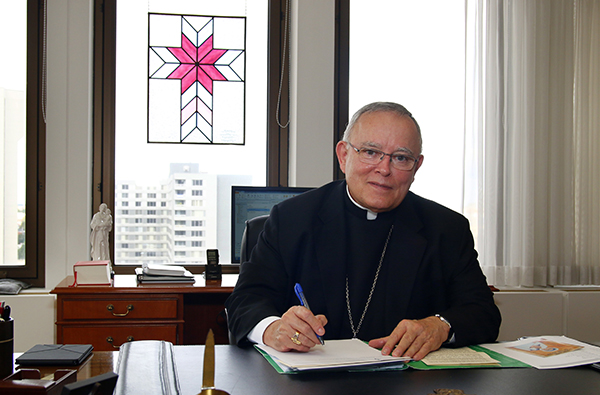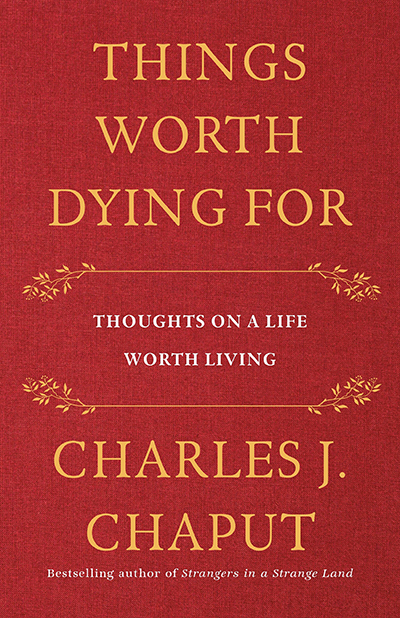
MANHATTAN — When it comes to people Christians should try to emulate, Archbishop Charles J. Chaput puts Samwise “Sam” Gamgee (a companion to protagonist Frodo Baggins in Lord of the Rings) at the top of the list.
“(Gamgee) pushed (Baggins) at times, carried him, sometimes. Christian friendship is about that,” said Archbishop Chaput, who retired as Archbishop of Philadelphia last year. “It’s about pushing each other, carrying each other, and the struggle really to be good disciples of Jesus.”
The friendship Gamgee showed Baggins earned him the dedication page in Archbishop Chaput’s new book, “Things Worth Dying For: Thoughts on a Life Worth Living,” released on March 16, written as “For all the Sams with gratitude and friendship.”
Friendship is also at the foundation of the book as something worth dying for. More specifically, it’s friendship with God and friendship with each other, along with family, that he calls “the most important, significant things to die for.” And he hopes this book will reignite that mindset and steer readers back towards God.
“[The purpose] is to make us serious about living and to take our responsibilities to God and one another seriously,” Archbishop Chaput said. “Life is so important. We have to live well if we’re going to die well and vice versa. If we’re going to die well, it’s because we lived well.”

The book itself is a reflection on what Archbishop Chaput found is worth living for in his own life once he had time to reflect on it in retirement, which goes back to God, family, and friends. At the same time, the book’s pages explore how modern society has drifted people away from that foundation and how people can find their way back.
Recognizing the importance of memories — both personal and of the Christian faith — and pondering death are two places to start. Memories, Archbishop Chaput said, “remind us where we came from and who we are,” and they’re what our “faith is built on.”
“Our relationship with God other than the personal relationship we have is based on the memories of the church community and broader than that, the Jewish community before us. So, we are people of our memories, and without our memories, we wouldn’t have faith. We wouldn’t have personality,” said Archbishop Chaput, who is also the author “Strangers in a Strange Land: Living the Catholic Faith in a Post-Christian World.”
Archbishop Chaput puts equal weight on the importance of pondering death. It serves as a reminder, he said, that “we determine what eternal life is going to look like by our lives here.”
“If Christians could go through life with one eye on heaven and one eye on earth, the world would be a much better place, and we would all be better persons,” said Archbishop Chaput. “The truth is we don’t keep one eye on heaven, and we put too much attention on earth.”
“We need two eyes. One looks up, and the other one looks forward.”
As for the archbishop’s assessment of present times, in the book, he identifies several drawbacks of modern culture that keep people away from living faithful Christian lives. These include consumerism, a media culture that stokes divisions, declining marriage rates, a political and economic system — and advances in technology — that hurt family structure.
In a conversation with The Tablet, Archbishop Chaput boiled it down to two main concerns he has with contemporary culture: autonomy from God and one another and “fleeing from history.”
With the former, he notes that God is disappearing from people’s lives in the United States “in a way that’s very unhealthy.” Meanwhile, people are becoming autonomous from one another as technology isolates people more and more.
Archbishop Chaput’s concern with the lack of interest in history from society is rooted in his belief that eliminating history will stunt society’s growth. Take cancel culture, for example, which he says is an effort to “get rid of the past thinking we’ll do it differently in the future.”
“Well, we won’t do it differently because human beings are doomed to keep repeating these things because we’re rich in sin, and we need those memories of the past to keep us from repetition,” Archbishop Chaput argued.
Amid the temptations that exist in an increasingly secular society, his aforementioned concerns, and a declining number of Christians nationwide, the archbishop said it’s important for Christians to focus on themselves, their family’s and continue to live a faithful life.
“We can’t control anybody but ourselves,” said Archbishop Chaput. “Just trust God and live as faithfully as we can. And we should try and bring the world with us because we’re an evangelizing religion, but that doesn’t mean we’re going to have the vast majority. It means that we’re supposed to reach out to those we can reach out to.”
